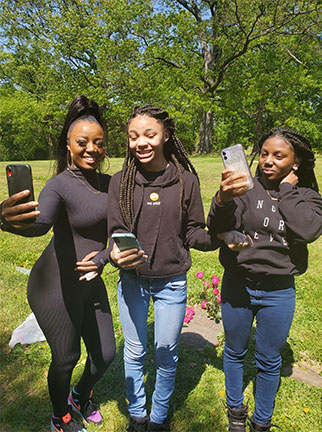Katrina Branch: Home Visits Worked for This Community
Home visits came into my life at a very trying time. I was fighting for custody of my sister’s children. I was fighting to keep them together. I was fighting to get on a lease to prevent them from being evicted. When the note came home in my niece Mikelle’s backpack, I thought it was just another fight about to happen.
Mikelle came to me in her first-grade year after her mom, my sister, was tragically killed along with my nephew. She initially went to stay with my mom, but then my mom passed away around Thanksgiving time before I stepped up to take care of my sister’s children. The complex where she was living wanted to put the kids out in 17 days. In that time, this note about home visits came in, so I was very apprehensive. Overnight I had gone from being a mom of two to a party of seven. I lived in Pennsylvania when my mom passed away, but I dropped everything and moved my kids to Southeast DC immediately, and I was in the middle of so much turmoil. The last thing I wanted was this home visit.
I talked to some of the other parents in the neighborhood to learn more about what was going on. I asked them if this was a serious matter that I needed to worry about. I asked them if I should agree to it or not. One of my neighbors assured me that it was okay. She said it was not bad, and they’re not coming to take away your kids. So I started softening to the idea.
I eventually pushed my pride to the side. I said to myself, “This is not for me. This is for my niece.” So I agreed to do it. I was still nervous. I did extra cleaning the night before and had the kids clean up too.
It was nothing like what I expected. It wasn’t like the teachers were coming to check on me and look at my home, which is what I thought it was. I thought they were going to come in and find something to take my niece and other kids away. In my time in school, teachers would come because you were in trouble or because you were absent from school. There was some kind of bad report. It was not positive at all.
That first home visit over the summer turned out to be a great opportunity for me and the rest of the kids in the household. The visit was awesome. The teachers and I became friends. It was a relationship.
They asked me what my hopes and dreams were for my niece. At first, I stumbled on the question. No one has ever asked me that question about my kids. I wasn’t sure how to answer. I really was just trying to hold things together for the kids. We were in survival mode. I said I just wanted my niece to have a great school year, but as I relaxed and thought about it, knowing my niece, I told them she deserved to be on stage somewhere in the future, down the line, go off to college and all that.
Finally, I got comfortable and invited them to see Mikelle’s room. They asked all kinds of questions about things Mikelle liked. They said it was so that they could have a book or something there on the first day of school to get the year started off right. When the school year started, everyone knew what Mikelle and her siblings were going through. By this time, some of the kids were staying with other family members from time to time to give me a little rest. So the school made sure they could see each other in the morning at breakfast to do what they could to ease the separation anxiety she was having. She’d lost her mom and grandmother in a short period of time. And other teachers made sure the siblings saw each other at different times during the school day.
The teachers sent home a postcard after that visit. Mikelle was so excited to get something in the mail. We kept that postcard on the fridge for years. She became so much more excited to go to school after that home visit. She became an honor roll student. And because she started taking school seriously, her siblings did too. Every year, we looked forward to a home visit, and we would ask if we didn’t hear about them right away.
That home visit changed me too. I found myself at the school more often. I would stay throughout the day to help teachers out. Before that home visit, I don’t think I fully understood teachers. I thought they taught the kids and sent them home, and that was it. I wound up helping out in the school office a lot. I learned just how much teachers went through. In my community, there were often a lot of parents who were angry or scared of one thing or another. They were asking questions, but many of them were afraid to go into the school building. I later joined the PTO to advocate not just for my nieces but for all the parents who were bringing their concerns to me. I liked helping them and the teachers get on the same page. Suddenly, in the midst of the chaos of my life, I was doing bake sales, raising money for different activities, and supporting the many initiatives happening at the school at the time. It was so fulfilling, and I became friends with a lot more teachers. I am still friends with them today, even though my niece is all grown now.

(L-R) Lynnett is my 27-year-old daughter. Mikelle is my 17-year-old niece, and Takirah 18-year-old niece.
After that first visit and helping out in the school more, Miss Lucas—I like to call her that
because she was my niece’s teacher—said that she thought I would be a great trainer for PTHV. I wound up doing trainings with Ms. Bryant, another teacher at Stanton Elementary. I soon met Yesenia and went to a big conference, so that first encounter turned out to be the opportunity of a lifetime. I got to train teachers all over the country and really learn what they experience.

Trinikqua is my 30-year-old daughter.
I found out teachers don’t have enough time to teach. I found out that parents need to be a little patient with teachers. And I learned that hopes and dreams are important for parents to think about. I learned there’s so much work to be done to take care of kids’ social-emotional needs. When I think about my niece’s and my situation, it was about all of us, me, the schools, everyone working together. We need more of that. The community we lived in—it was kinda rough. And things weren’t going well at the school. They’d gone through several principals before my kids came. But when we enrolled, the new principal had a plan to turn things around, and home visits were part of the plan. It worked for this community.

